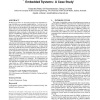Free Online Productivity Tools
i2Speak
i2Symbol
i2OCR
iTex2Img
iWeb2Print
iWeb2Shot
i2Type
iPdf2Split
iPdf2Merge
i2Bopomofo
i2Arabic
i2Style
i2Image
i2PDF
iLatex2Rtf
Sci2ools
135
click to vote
CODES
2007
IEEE
2007
IEEE
Ensuring secure program execution in multiprocessor embedded systems: a case study
Multiprocessor SoCs are increasingly deployed in embedded systems with little or no security features built in. Code Injection attacks are one of the most commonly encountered security threats. Most solutions to this problem in the single processor domain are purely software based and have high overheads. A few hardware solutions have been provided for the single processor case, which significantly reduce overheads. In this paper, for the first time, we propose a methodology addressing code injection attacks in a multiprocessor domain. A dedicated security (monitor) processor is used to oversee the application at runtime. Each processor communicates with the monitor processor through a FIFO queue, and is continuously checked. Static analysis of program map and timing profile are used to obtain program information at compile time, which is utilized by the monitor processor at runtime. This information is encrypted using a secure key and stored in the monitor processor. A copy of thi...
Code Injection Attacks | CODES 2007 | Hardware-Software Codesign | Monitor Processor | Single Processor |
Related Content
| Added | 02 Jun 2010 |
| Updated | 02 Jun 2010 |
| Type | Conference |
| Year | 2007 |
| Where | CODES |
| Authors | Krutartha Patel, Sridevan Parameswaran, Seng Lin Shee |
Comments (0)

